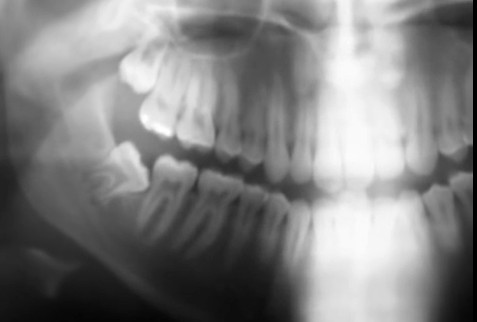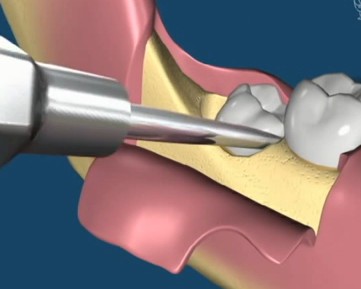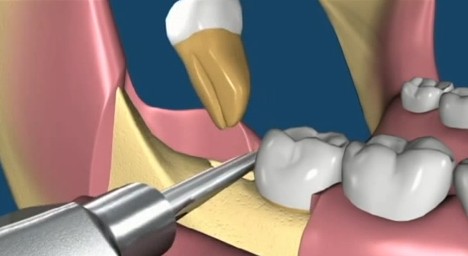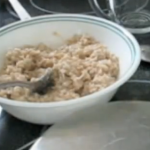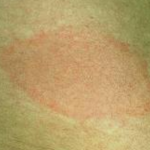Wisdom teeth (also called third molars) are the third and final set of molars that most people get in their late teens or early twenties. Sometimes these teeth can be a valuable asset to the mouth when healthy and properly aligned, but more often, they are misaligned and require removal. Wisdom teeth commonly affect other teeth as they develop, becoming impacted or “coming in sideways.” Thus they need to be extracted or removed.
Why do we have wisdom teeth?
Anthropologists believe wisdom teeth were the tool to our ancestor’s early diet of coarse, rough food – like leaves, roots, nuts and meats – which required more chewing power and resulted in excessive wear of the teeth. The modern diet with its softer foods, along with marvels of modern technologies such as forks, spoons and knives, has made the need for wisdom teeth nonexistent. As a result, biologists now classify wisdom teeth as body parts that have become functionless due to evolution. Some people never get wisdom teeth, but for those who do, the number may be anywhere from one to four – and, on very rare occasions, more than four.
Wisdom teeth infection symptoms
Because human jaws have become smaller throughout evolutionary history, when wisdom teeth form they often become impacted, or blocked, by the other teeth around them. Also, if the tooth partially erupts, food can get trapped in the gum tissue surrounding it, which can lead to bacteria growth and, possibly, a serious infection.
Wisdom teeth that do not erupt but remain tucked away can also lead to oral problems, such as crowding or displacement of permanent teeth.
Wisdom Teeth Pain Relief
Wisdom tooth pain should not be taken lightly. While at-home pain management is an option for some patients, in most cases wisdom tooth extraction is the best way to alleviate wisdom tooth pain and protect your oral and overall health and well being. There are some simple things that can temporarily relieve the pain of an impacted wisdom tooth:
- Rinsing your mouth with a warm saltwater solution by swishing it around for 30 seconds and then spitting it out will help ease the pain around the infected tooth.
- Oral numbing medications can be applied to the affected area.
- Chewing gum will gently massage the irritated area.
- In the case of severe pain/swelling: Applying hot or cold compresses to the area may give some relief.
- Painkillers and anti-inflammatories (e.g. paracetamol, aspirin and ibuprofen) can help bring pain relief.
Wisdom Teeth – Extraction
Not all wisdom teeth need to be extracted. When a wisdom tooth erupts cleanly through the tissue without compromising the adjacent tooth, the wisdom tooth can be retained in the mouth. However, removal of the wisdom tooth is indicated if the tooth has partially erupted through the gingival tissue causing inflammation and at times infection. Dentists believe it’s better to remove wisdom teeth before the roots are fully formed, when someone is younger and more likely to recover faster from surgery. This is why some young adults have their wisdom teeth pulled before the teeth cause problems and become more firmly rooted in the jaw. The best time to get those suckers out is when the roots are about two-thirds formed, which is generally between the ages of 15 to 18.
An oral surgeon or your dentist can remove a wisdom tooth. Before removing it, your dentist will give you a local anaesthetic to numb down the area where the tooth will be removed. To remove the wisdom tooth, your dentist will open up the gum tissue over the tooth and take out any bone that is covering the tooth. He or she will separate the tissue connecting the tooth to the bone and then remove the tooth. Sometimes the dentist cuts the tooth into smaller pieces to make it easier to remove. After the tooth is removed, stitches are done.
Wisdom Teeth Removal Cost
Wisdom teeth removal cost is more compared to other teeth. It would be an arduous task to explain the wisdom tooth removal cost. This is simply because the total cost is determined after the evaluation of a few factors. In situations where the impaction is complicated in some way or the other the wisdom tooth removal cost automatically goes up. If the tooth is fused to the bone or the roots of the wisdom tooth have an abnormal curvature then, the removal is more expensive. A normal wisdom tooth extraction costs around 220-270$ but in complex cases it may cost more than 600-650$.
After Wisdom teeth removal
- Do not spit or talk for half a hour after the tooth has been extracted.
- Allow the cotton to remain there for half an hour after that dispose the cotton off and do not replace it with a new cotton. Apply ice from outside.
- Do not eat half an hour. Restrict your diet to something soft and cold for atleast one day.
- Minor Swelling and discomfort can be anticipated for a day or so.
- Do not use a straw for the first few days. Sucking on a straw can loosen the blood clot and delay healing.
- Do not smoke for at least 24 hours after your surgery. The sucking motion can loosen the clot and delay healing. Also, smoking decreases the blood supply and can bring germs and contaminants to the surgery area.
- Avoid rubbing the area with your tongue or touching it with your fingers.
Wisdom teeth removal pictures
